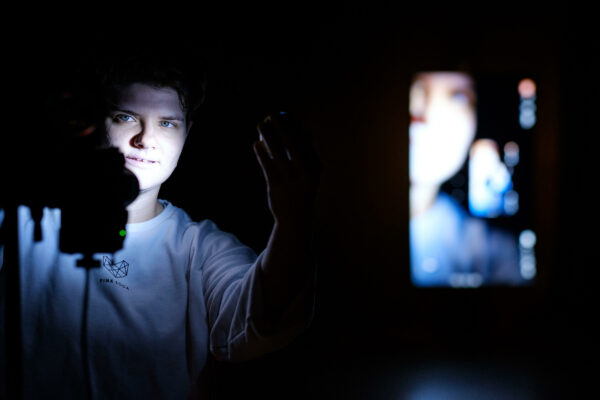The Infinity Mirror Review
20.05.2022
Lily Hayman and Thomas Doyle’s The Infinity Mirror highlights the universal fear of fast-progressing technology in a feminist light. It provokes thoughts of how technology in the future might be used to bring down and hurt people, and how it’s being used now.

Walking into The Flying Nun – an intimate, inviting space – you instantly feel welcomed and combined with Lily’s warmth and charm you can’t help but feel safe. The show starts this way – in an upbeat, happy-go-lucky, nothing can go wrong kind of way. But as the lights begin to shift you slowly start to feel more uncomfortable and uneasy. Lily lies on the floor obsessively counting the peaks on the ceiling when she gets a phone call. Annoyed that someone would be calling during her “writing day” she ignores it. But it continues to ring, and ring, and ring. Finally, she picks it up and is greeted with shouts from the other end, with orders to look up her name. Confused, she does and finds something earth-shattering. Web pages full of links to pornographic videos with her in them. Videos she never made; videos with another woman’s body but her face and name. The answer as to how they were made is simple.
Deepfakes. The definition of ‘Deepfake’ is this; a video of a person in which their face or body has been digitally altered so that they appear to be someone else – typically used maliciously or to spread false information.
Pretty gross, right?

The Infinity Mirror is a direct communication between Lily and the audience, with Lily delicately yet truthfully speaking her inner dialogue; troubled with what to believe. Should this deepfaked, made-up version of Lily really matter so much? It’s not really her, is it?
Yet it is her, and it’s real to everyone who sees it. This backwards and forwards of what to think and what to feel is represented beautifully when Lily has conversations with an AI-generated version of herself, lurking to the side of the stage on a large screen, looking forward with an eerie, uncanny valley feel.
Something refreshing and pleasing about this show is that it isn’t focused on the person who deep faked her, but instead centres around the personal experience of Lily. While this play isn’t a completely true story, Lily does an excellent job at conveying her character’s emotions and articulating exactly what she’s feeling; making you feel engrossed in the world and connected to her. After watching, it’s easy to start wondering what you would do if you were deepfaked, and honestly, it’s bloody scary.
The Infinity Mirror is a creatively put together and necessary piece of theatre. It has feelings of importance and empowerment. The directing is sharp and the acting is absorbing. While the story of being deepfaked may be new, the underlying theme of women constantly being used and extorted like a product for the benefit of men is not a new theme. The Infinity Mirror begs the question – how do we protect future generations from this?
4 Stars.
Astra, 16 [she/her]
BrandX’s The Infinity Mirror played at The Flying Nun from 20-21 May.

